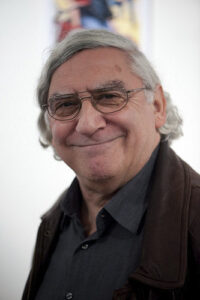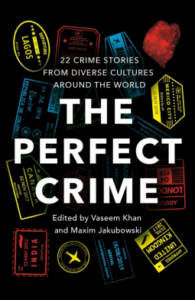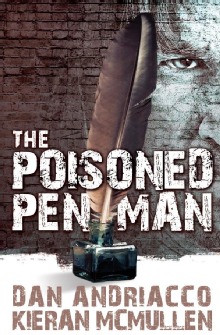

 Can you tell us a little about the anthology “The Perfect Crime”?
Can you tell us a little about the anthology “The Perfect Crime”?
MAXIM: ‘The Perfect Crime’ features brand new stories by authors from diverse backgrounds and from around the world. As a judge for the Crime Writers’ Association Daggers and a regular reviewer, I was struck by the increasing number of emerging voices who were not drawn from the ‘usual’ (i.e. white and middle-class) talent pool. Yes, there have been pioneers such as Chester Himes, Walter Mosley, Mike Phillips and others, but this was a vibrant new movement worth celebrating. And so the idea for the anthology was born!
What was the inspiration behind this anthology?
VASEEM: Unless you’ve been on Mars, you’ll know that the winds of diversity are blowing a gale through the industry. Crime fiction has chosen to embrace the change. Criminals, after all, are the most politically-correct bunch on the planet. The average criminal will happily rob, loot, cheat and murder anyone regardless of creed, colour, race, gender or background. For me, personally, the anthology is a watershed moment. Readers are intelligent consumers, but the industry has sometimes assumed them not to be, believing that the average reader might become dazed and disoriented by a ‘funny-sounding’ name on the cover, or crime stories featuring characters not from their own cultural background. Nonsense! Most crime readers simply want a well-crafted, intriguing tale that immerses them in a particular world. Preferably, with dead bodies.
This anthology features twenty-two bestselling crime authors from diverse cultures, what was the process of creating this anthology?
MAXIM: We agreed on a ‘wish list’ of contributors, including emerging and experienced voices from around the world, then made our approaches. Thankfully, nearly all embraced the project, recognising its importance; a few were unable to contribute due to workload. But this enabled us to bring in newer voices such as Shawn Cosby and David Heska Wanbli Weiden who, when the project was initiated, were still relatively unknown.
Can you tell us about the overall theme of the anthology?
VASEEM: This anthology is a celebration of crime writing, not a lecture. Our only stipulation vis-à-vis theme was that the tales had to be crime or mystery stories. Our writers did not disappoint! In the anthology, you will find enough killers, stalkers, and conmen to fill several prisons (or political parties). Duplicity, psychological terror, and good old-fashioned murder grace these pages. Our authors’ warped minds have been given free rein – and we’re damned proud of them.
What drew you to the mystery genre?
MAXIM: I have always been drawn to genre fiction and popular culture. Following a flirtation with SF & Fantasy, I grew to appreciate crime and mystery writing; more so when I began to work in publishing and made wonderful discoveries and friendships in the genre. It offers both incomparable entertainment and a subtle approach to the understanding of human and social nature. What else do you want in a story?
VASEEM: The idea that I might discover how to commit the perfect murder. (There were people I needed to dispose of. Bad people. My former art tutor, for one.) Crime novels are like sundaes. There are layers of deliciousness. Depravity, intellectual challenge, diverse settings, great characters, and the ability to comment on the world. My Malabar House novels, set in 1950s India, allow me to ‘correct’ some of the biased narratives about Britain’s colonial ‘adventures’ in India. What better vehicle to do so than a compelling murder mystery?
How is the process of writing an anthology different from a full novel?
MAXIM: It’s totally different. I enjoy assembling anthologies and have edited more than a hundred. Writing a novel is a different craft and one I find rather painful if, career-wise, obligatory. One of my greatest joys editing anthologies is the opportunity to introduce new writers to readers.
What is something you think readers will take away from these stories?
VASEEM: That the world of crime writing is a wild and woolly place, with plenty of gunslingers in town. And they don’t have to look like us to offer us a great reading experience.
What is your advice to aspiring writers?
The main reason agents reject debut manuscripts is that they aren’t written to a publishable standard. So spend time honing your craft – by writing … A LOT!
What kind of books did you read growing up?
MAXIM: Jules Verne, Agatha Christie and Mickey Spillane, alongside many French popular writers as I was brought up in France. A holy trinity and indicative of my tastes: a sense of wonder and adventure, an appreciation of the carefully-composed puzzle and a keen taste for ‘noir’…
VASEEM: Books featuring white people and written by white people! I jest, of course, though only partially. The Famous Five, Secret Seven; then a lot of SF and literary, before I fell in love with Agatha.
What are you currently reading?
MAXIM: I’m having a few weeks away from crime as the monthly review column I have written for 30 years takes a December break. John Irving’s The Last Stairlift, Leonard Cohen’s A Ballet of Lepers and Bret Easton Ellis’ The Shards.
VASEEM: I always have four books on the go: Bathroom Book, Train Book, Bedtime Book, and Just For The Heck of It Book. Currently: In the Electric Mist with Confederate Dead by James Lee Burke; and Dead Man’s Creek by Chris Hammer.
About the Editors
Originally from England, Vaseem Khan holds a bachelor’s degree in accounting and finance from the London school. After university, he spent a decade in India helping to establish a chain of five-star, environmentally friendly ‘ecotels’ for one of the country’s premier hotel groups. Vaseem is the author of two crime series, Baby Ganesh Agency and Malabar House, both set in India. Currently, he now works at University College London for the Department of Security and Crime Science.
Maxim Jakubowski, who is also Chairman of the Crime Writers’ Association, has had a long career in publishing. Being an editor for many years, he has edited works by Oliver Stone, Jim Thompson, the Sex in the City series, and many more. Maxim has even owned his own bookstore called The Murder One Bookshop, which he ran for over 20 years. Currently, he writes, edits, and translates full-time in London.

